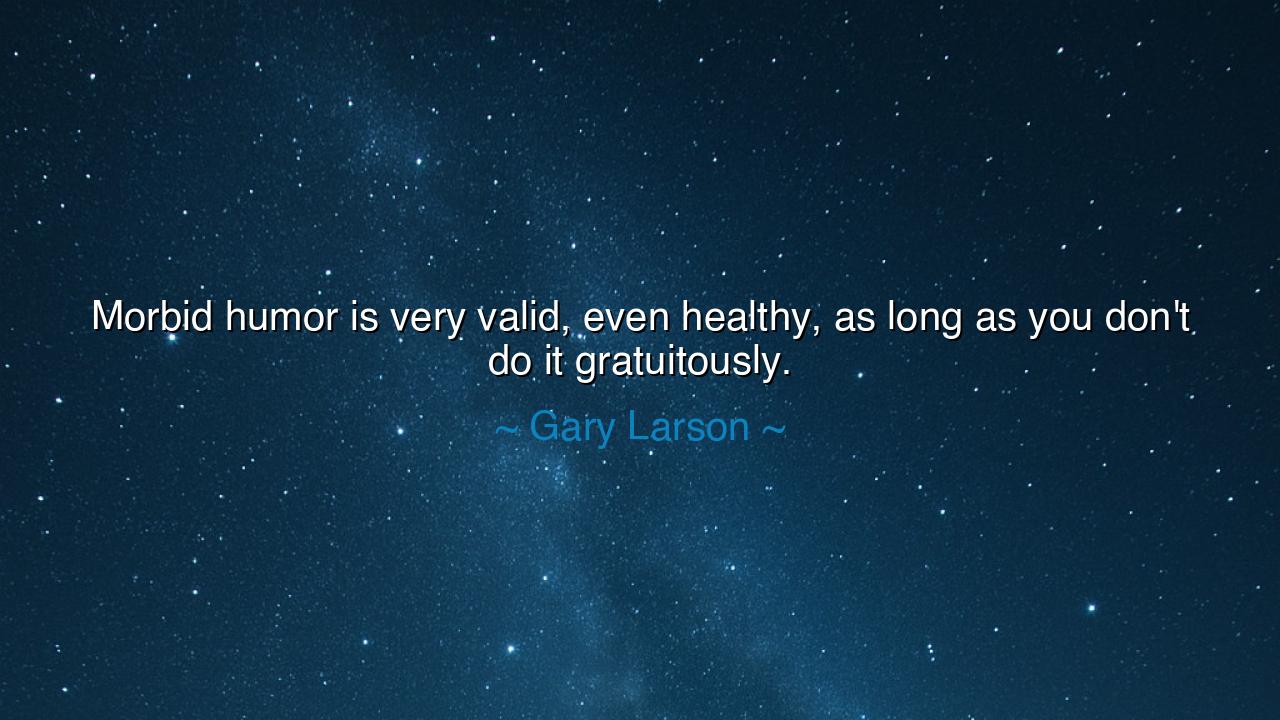
Morbid humor is very valid, even healthy, as long as you don't do






When Gary Larson declared, “Morbid humor is very valid, even healthy, as long as you don't do it gratuitously,” he spoke as one who understood the delicate alchemy between darkness and laughter — the union of tragedy and wit that has defined the human spirit since the dawn of thought. Beneath his comic absurdities and grotesque creatures lay a philosopher’s understanding: that humor is not the opposite of pain, but its companion. In his words, there echoes a truth both unsettling and liberating — that to laugh at the grim, the frightening, and the inevitable is not disrespect, but healing. For only when the heart can mock its own mortality does it prove that it is truly alive.
Gary Larson, the creator of The Far Side, drew his humor from strange corners of existence — from the macabre, the awkward, and the absurdity of death itself. His morbid humor was not cruelty; it was honesty wrapped in wit. He showed that cows could think, insects could philosophize, and scientists could destroy the world while laughing about it. Through this, he revealed that the line between life and death, sanity and madness, is as thin as a punchline. Yet his warning — “as long as you don't do it gratuitously” — carries the wisdom of restraint. He reminds us that humor about death or tragedy must serve the living, not mock the dead. Laughter must lift, not wound. It must bring perspective, not desensitization.
The ancients, too, knew the power of morbid humor. In the shadow of war and plague, even philosophers found solace in laughter. The Roman thinker Seneca once wrote that to laugh at misfortune was a form of mastery over it — that the man who can find humor in tragedy has already triumphed over fear. In the same spirit, the medieval jesters were permitted to joke even about death before kings and queens, not because death was light, but because laughter gave humanity power where reason faltered. In every age, those who have suffered most have often been those who laugh the loudest. The gallows joke, the soldier’s laughter, the nurse’s dark wit — these are not signs of cruelty, but of survival.
History gives us many examples of this sacred kind of laughter. Consider the soldiers in the muddy trenches of World War I, who, facing death each day, painted absurd slogans on their helmets and joked about the futility of war. Their humor was not callousness, but courage — the courage to face terror and remain human. In the hospitals of war, doctors and nurses traded grim jokes to keep their hearts from breaking. In prisons, in plagues, in mourning — wherever despair threatened to swallow the spirit, humor became a lifeline, a quiet rebellion against the darkness. Larson’s insight reminds us that this form of humor is not disrespect; it is resistance — the laughter that keeps the soul from dying before the body does.
But Larson’s wisdom carries a warning: do not wield darkness carelessly. The ancients would have called this moderation, or balance — the principle that all things, even laughter, must serve harmony. To joke about pain without compassion is to wound the sacred. Morbid humor must never be a weapon; it must be a mirror. It should reflect the absurdity of existence, not the cruelty of men. When used with heart, it becomes art — a way of helping others face what they fear to name. When used without care, it becomes mockery — a way of escaping empathy instead of deepening it. Thus, his words guide us toward wisdom: laugh with life’s shadows, not at them.
There is strength in what Larson teaches. To embrace morbid humor is to acknowledge that we are mortal, yet unbroken; fragile, yet unafraid. It is to accept that the universe is vast and indifferent, yet we — small and temporary — can still laugh within it. This laughter is not trivial. It is holy. It says, “You cannot defeat me, even when you end me.” It is the same laughter that rang in the hearts of those who faced plagues, wars, and despair — laughter that carries the sound of defiance and redemption.
So let this lesson endure: learn to laugh at the darkness, but never lose your light. Use humor to heal, not to harm. When you face hardship, let your laughter be wise — laughter that understands, forgives, and uplifts. Seek not jokes that numb the heart, but those that awaken it. For in laughter born of truth, there lies the most powerful form of courage — the ability to face life’s morbid mysteries and still, somehow, smile.
In the end, Gary Larson’s words remind us that humor is the soul’s rebellion against fear. The one who can laugh at the edge of the abyss does not deny its depth — he simply refuses to fall. Morbid humor, when born of empathy, is the laughter of survival — the laughter of those who have seen death and chosen, still, to live.






AAdministratorAdministrator
Welcome, honored guests. Please leave a comment, we will respond soon